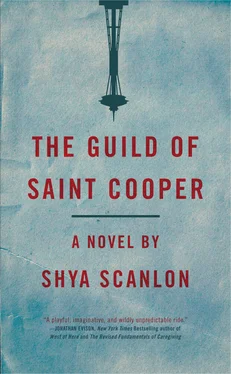The woman winced as though protecting herself from a sneeze. “What’s wrong with you?” she asked. “Are you okay?”
I was sweating and felt a bit dizzy because of the fumes I’d inhaled, but I didn’t think I was too far gone. What was she talking about? I became suddenly anxious. I stepped away from the sculpture. Perhaps it wasn’t Fred’s after all. Surely there was more than one of these things around. Fred could have made up his story. Fred could have lied. It was a mass-produced lawn ornament sold at Crate & Barrel. It was a mail-order sculpt-by-numbers kit. In any case, it was inappropriate, at the moment, to question the work’s provenance, or even its taxonomy. I redirected.
“Do you know a guy named Zane?”
I drew a circle around my face to indicate his ink, and the woman watched as though following a doctor’s finger. Hypnotized, who knew what she might reveal? Unfortunately, a car horn sounded before she could answer, and her large brown eyes grew wide.
“Tiger,” she called, looking around for her son. “Tiger, come here this instant!”
The boy came bounding across the yard from a hole in the fence, clapping his hands arrhythmically, and together the two walked quickly up the driveway. There was a loud cheer at the front of the house, some whistling and applause. Though curious, I held back for a moment, helping to protect the environment. My encounter with community was not going quite as I’d planned, and these were clearly not my people. A yellow Frisbee soared overhead from one adjacent yard to another. It seemed to move impossibly slowly, I thought, like it should fall instead of fly.
We did some good work, the bird and I, but in the end I had to move on. It’s an old story.
By the time I made it to the front yard, people were dispersing from the side of an idling white Lexus. Whoever they’d been cheering for was back in its belly, and the windows, tinted, were rolled up. I walked close enough to see my reflection in the glass and marveled at the clean car, all polish and shine. It picked up some of the color around it, greens and browns glowing in its side panels like a blush. Then the back window silently descended and a face appeared out of the darkness within. It was a woman — at least, it was a girl. I’d never seen a more beautiful face. It hovered a moment, letting me gaze at it. Its eyebrows were fine, almost black, and arched above equally dark eyes, big in their sockets, and glassy. Near-white skin surrounded these features and connected them to the bright red lips of a narrow mouth. I took a deep breath, as though to breathe it in, but it broke my trance by speaking.
“What’s your name?” said the face.
“Blake Williams,” I said.
Then, from inside the car, came a man’s excited voice. “There, you see? I told you it was him!”
The girl nodded and smiled quickly before the window rolled up, and the car pulled away quietly and rolled down the block. By the time it had turned the corner, most folks had returned to work. A few young girls walked about the grounds, securing the scaffolding and piling empty paint cans. I looked for the woman I’d spoken with, but she and Tiger were nowhere in sight. I was about to stop a man with spikes sticking out of his cheeks but felt a hand on my shoulder and turned around. It was Zane. I was in no way surprised.
“Who was that in the car?” I asked.
“ That was my boss, Russell Jonskin.”
“Her name is Russell?”
“Oh, you must mean Aya. Anyway, Russell asked me to tell you he’d like to have dinner with you tomorrow night.” “With me? Why?”
“You wrote Forecast , right? Forecast is a book that interests Russell.”
A feral cat remarkably like the one we’d lost skittered across the street, and Zane craned his neck to follow my gaze. A drug dealer who has strong opinions about art should have interested me, but I couldn’t ignore the red flags in this particular case. There was this “birth house,” for instance. The cat shot us a glance and then disappeared.
“You guys must be really into Twin Peaks ,” I said.
Zane frowned. “Can I tell him you’ve accepted?”
“Will Aya be there?”
“Are you fucking with me? This is kind of an honor, Blake.” Zane looked off into the distance and sighed. “Yes, she’ll probably be there.”
“Why not,” I said. “Always nice to meet a fan.”
Zane walked off toward the painted house. “Great,” he said over his shoulder. “They’ll be at your place by five.”
“Wait, my place?”
“Say hi to your mom for me!”
I went home.
The front door was wide open, which was unusual. Last year a raccoon family had moved into the closet in the front room, and after a frightening encounter as the season changed, we realized they must have been coming and going as they pleased through our perpetually gaping and unguarded doors. I leapt up the steps, closed the door behind me, and passed through to the back porch. I was eager to report our neighbors’ working conditions, being as they were a reflection of general competence and wherewithal. What kind of protection could we get from a community who didn’t even watch out for their own neurological health? Whatever my conclusions on those particular people happened to be, it wouldn’t contradict her basic point, per se, but my plan, as usual, was to compensate for my lack of sure footing with quick steps. They’re dangerous. They’re irresponsible. They’re weird. I hit the back porch already blathering, resolved to convince my mother out of forcing me out of the house.
But she wasn’t there.
I squatted and squinted to see through the thickening trees, apples obscuring my view to the garden. I called out. I peeked into her bedroom window, then went around back to the shed, which I’d locked the day before. Nothing. I ran upstairs and called down the basement stairwell and waited, listening. I listened hard, trying to hear over my heartbeat. There was no note on the counter, her shopping bag was on its hook, and even her sandals lay upside down in their usual place.
I thought of a cat we’d had when I was a child. One night the cat — so old by then he had trouble walking — simply didn’t come home, didn’t come when called, and my father had explained over dinner that cats know when they’re going to die, and find a place away from their homes to do it. He’d tried to persuade me that this was an honorable thing to do, and it was his honest expectation that I’d be cheered by this information. How could I remain focused on my own private feelings of loss when confronted by the great mystery of natural instinct? I suddenly felt like a fool for never having verified this information, tried to force the thought from my head, and failed. I sat down, stunned. Then there was a loud cough upstairs, and I went up to find my mother smoking a joint and watching TV.
I sat down beside her and took a hit. They were doing a story on a recently uncovered scandal involving the FBI, the black community, and textile manufacturers in Southeast Asia. Apparently, low-riding pants had been popularized by prison moles of a secret government research team whose charter was to prevent the ability to run — an opt-out social engineering mechanism to control minority populations.
“It was the crack of the new millennium,” said an outraged Harvard law professor who’d helped uncover the conspiracy.
I exhaled smoke into the TV’s gray-blue glow. “Zane’s boss is coming for dinner tomorrow night,” I said. “Hey, I just saw a cat that looked just like the one we lost. Think it could have had kittens?”
“No,” she said. “His boss — you mean the guy who grows my grass?”
“I don’t know if he grows it, but yeah, that guy, the man who wrote that letter Zane left the other day.”
Читать дальше












